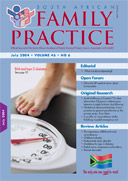Audit of efficacy of Coartem™ to clear plasmodium falciparum malaria parasitaemia at single forty-two day follow-up.
Abstract
Background: A follow-up study was undertaken to assess the efficacy of CoartemTM tablets (20 mg artemether and 120 mg lumefantrine – Novartis South Africa (Pty) Ltd) to clear plasmodium falciparum malaria parasitaemia at a single 42-day follow-up, with 42 days being chosen in order to detect early emergence of resistance. The study was performed at Ndumo Clinic and Mosvold Hospital in the Ingwavuma District of KwaZulu-Natal, South Africa in January/February 2002. Method: The study included 37 patients presenting to Ndumo Clinic and two presenting to Mosvold Hospital with uncomplicated malaria diagnosed by symptoms and a positive immunochromographic test (ICT) for plasmodium falciparum. The main outcome measures were Trophozoite counts on thick film and polymerase chain reaction parasite analysis of blood spot at day 42. Results: Only 31 of the 37 recruited patients were confirmed to be suffering from malaria by polymerase chain reaction (PCR). Of the 31, 24 returned for follow-up. One patient had parasitaemia at day 33, but tested negative at day 42 after re-treatment with Coartem™. It was not determined whether this patient was suffering from a recrudescence or re-infection of falciparum malaria. All the other returning patients tested negative for falciparum malaria on blood film and PCR examination. Conclusions: CoartemTM still appears to be an effective treatment for falciparum malaria. Regular assessment of its efficacy is desirable. (SA Fam Pract 2004;46(6): 21-24)
Published
2004-07-01
Issue
Section
Original Research
By submitting manuscripts to SAFP, authors of original articles are assigning copyright to the South African Academy of Family Physicians. Copyright of review articles are assigned to the Publisher, Medpharm Publications (Pty) Ltd, unless otherwise specified. Authors may use their own work after publication without written permission, provided they acknowledge the original source. Individuals and academic institutions may freely copy and distribute articles published in SAFP for educational and research purposes without obtaining permission.

